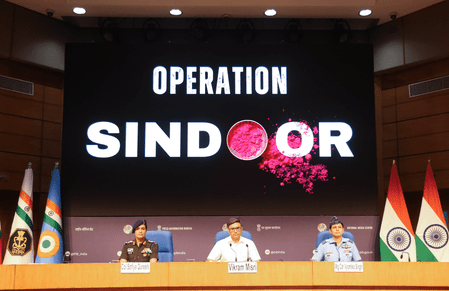New Delhi, Oct 23 (IANS) After ‘Operation Sindoor’, there was a lull in Pakistan-occupied-Kashmir (PoK) as the ISI had pulled back all terror facilities and terrorists for the fear of being hit by the Indian armed forces. While terror groups have found it hard to regroup due to lack of resources and low morale, there are attempts now being made to set up terror camps in PoK. However, the fear of being detected has made the ISI change its strategy.
Currently the camps that are being set up are smaller in size. However, the big change is that the focus is more around technology rather than manpower. This is an indicator that future strikes on India would be heavily reliant on technology rather than manpower.
Intelligence Bureau officials say that terror groups such as the Jaish-e-Mohammad and Lashkar-e-Tayiba would use drones to carry out attacks and they are also attempting to add modern technology to boost their fighting skills. In future, equipment to track the movement of the Indian Army and Border Security Force would be used to avoid detection.
Further, the ISI has also provided these terror groups with technology to avoid drone surveillance and air strikes by the Indian Air Force (IAF).
The size of the terror camps is now smaller as ideally, a launch pad or camp would have around 100 members. However, this has been downsized to 50 now as a precautionary measure. Officials explain that this is a strategy to minimise damage in case of a strike by the Indian armed forces.
Prior to ‘Operation Sindoor’ there would be around 40 to 50 camps that would be in operation, but that, too, now has been reduced to just 8 camps. The strategy is new and is also aimed at minimising damage.
According to the new plan, the aim is to gradually bring back these camps and there would be no knee-jerk reaction this time, since the ISI wants to take no risk. Officials say that this would be the strategy by Pakistan to operate in a minimalist manner. This reduces the risk of a massive loss in the wake of India changing its doctrine on terror from Pakistan.
In the aftermath of the Pahalgam terror attack, the Modi government made it clear that an act of terror would not be considered to be a cross-border attack, but an act of war. Pakistan may have tried to portray that it came out on top in the aftermath of ‘Operation Sindoor’, but the reality is that it was badly bruised and its military exposed and embarrassed.
The resurfacing of these terror camps has raised the alertness levels among both the Intelligence agencies as well as the security forces.
Following ‘Operation Sindoor’, Pakistan had cleared out nearly 400 terrorists from PoK. All of them were waiting along the Line of Control (LoC) and the International Border to infiltrate into Jammu and Kashmir.
Not just the terrorists, but even the Pakistan Rangers who would usually facilitate infiltration into India by the terror groups had cleared out of PoK following the major operation by the Indian armed forces.
Another official said that these developments, although worrisome also signal that Pakistan was spooked by the retaliation by the Indian military.
During ‘Operation Sindoor’, the armed forces not just hit targets in PoK, but deep within Pakistan as well. Some of the major damages included the destruction of the Lashkar-e-Tayiba’s main training camp in Muridke and the Jaish-e-Mohammad’s headquarters in Bahawalpur.
–IANS
vicky/rad
Disclaimer
The information contained in this website is for general information purposes only. The information is provided by BhaskarLive.in and while we endeavour to keep the information up to date and correct, we make no representations or warranties of any kind, express or implied, about the completeness, accuracy, reliability, suitability or availability with respect to the website or the information, products, services, or related graphics contained on the website for any purpose. Any reliance you place on such information is therefore strictly at your own risk.
In no event will we be liable for any loss or damage including without limitation, indirect or consequential loss or damage, or any loss or damage whatsoever arising from loss of data or profits arising out of, or in connection with, the use of this website.
Through this website you are able to link to other websites which are not under the control of BhaskarLive.in We have no control over the nature, content and availability of those sites. The inclusion of any links does not necessarily imply a recommendation or endorse the views expressed within them.
Every effort is made to keep the website up and running smoothly. However, BhaskarLive.in takes no responsibility for, and will not be liable for, the website being temporarily unavailable due to technical issues beyond our control.
For any legal details or query please visit original source link given with news or click on Go to Source.
Our translation service aims to offer the most accurate translation possible and we rarely experience any issues with news post. However, as the translation is carried out by third part tool there is a possibility for error to cause the occasional inaccuracy. We therefore require you to accept this disclaimer before confirming any translation news with us.
If you are not willing to accept this disclaimer then we recommend reading news post in its original language.

